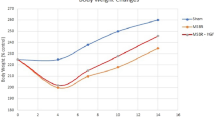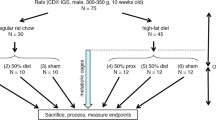Abstract
Recent evidence suggests that the adipose tissue-derived cytokine leptin (LEP) is involved in modulation of growth and differentiation of normal small intestine. The purpose of the present study was to evaluate the effects of parenteral LEP on structural intestinal adaptation, cell proliferation and apoptosis in a rat model of short bowel syndrome (SBS). Male Sprague-Dawley rats were divided into three experimental groups: Sham rats underwent bowel transection and re-anastomosis, SBS-rats underwent a 75% small bowel resection, and SBS-LEP-rats underwent bowel resection and were treated with LEP given subcutaneously at a dose of 20 μg/kg, once daily, from day 3 through 14. Parameters of intestinal adaptation (bowel and mucosal weights, mucosal DNA and protein, villus height and crypt depth in jejunum and ileum), enterocyte proliferation and enterocyte apoptosis were determined on day 15 following operation. Ileal tissue samples were taken for detection of bax and bcl-2 gene expression using RT-PCR technique. Statistical analysis was performed using the non-parametric Kruskal–Wallis ANOVA test, with P<0.05 considered statistically significant. Treatment with subcutaneous LEP resulted in a significant increase in jejunal (17%, P<0.05) and ileal (13%, P<0.05) bowel weight, jejunal (10%, P<0.05) and ileal (25%, P<0.05) mucosal weight, jejunal (26%, P<0.05) and ileal (38%, P<0.05) mucosal DNA, ileal (25%, P<0.05) mucosal protein, jejunal (41%, P<0.05) and ileal (21%, P<0.05) villus height, jejunal (37%, P<0.05) crypt depth, and jejunal (24%, P<0.05) and ileal (21%, P<0.05) enterocyte proliferation compared to SBS-animals. Enterocyte apoptosis increased significantly after bowel resection in jejunum and ileum compared to sham animals and was accompanied by an increased bax gene expression and a decreased bcl-2 gene expression in ileal samples. SBS-LEP rats showed a trend toward a decrease in enterocyte apoptosis in ileum and a mild decrease in bax gene expression compared to SBS-untreated animals. In conclusion, in a rat model of SBS parenteral LEP stimulates structural intestinal adaptation. Increased cell proliferation and decreased cell death via apoptosis may be responsible for this increased cell mass.





Similar content being viewed by others
References
Badman M, Flier JS (2005) The gut and energy balance: visceral allies in the obesity wars. Science 307:1909–1914
Barrenetxe J, Villaro AC, Guembe L, Pascual I, Muñoz-Navas M, Barber A, Lostao MP (2002) Distribution of the long leptin receptor isoform in brush border, basolateral membrane, and cytoplasm of enterocytes. Gut 50:797–802
Bates SH, Kulkarni RN, Seifert M, Myers MG Jr (2005) Roles for leptin receptor/ STAT3-dependent and -independent signals in the regulation of glucose homeostasis. Cell Metab 1:169–178
Bell-Anderson KS, Bryson JM (2004) Leptin as a potential treatment for obesity: progress to date. Treat Endocrinol 3:11–18
Biller JA (1987) Short bowel syndrome. In: Grand RI, Sutphen JL, Dietz WH (eds) Pediatric nutrition. theory and practice. Butterworth Publishers, Stoneham, pp 481–487
Booth IW, Lander AD (1998) Short bowel syndrome. Bailliere’s Clin Gastroenterol 12:739–772
Cammisotto PG, Renaud C, Gingras D, Delvin E, Levy E, Bendayan M (2005) Endocrine and exocrine secretion of leptin by the gastric mucosa. J Histochem Cytochem 53(7):851–860
Chaudhary M, Mandir N, FitzGerald AJ, Howard JK, Lord GM, Ghatei MA, Bloom SR, Goodlad RA (2000) Starvation, leptin and epithelial cell proliferation in the gastrointestinal tract of the mouse. Digestion 61:223–229
Chomczynski P (1993) A reagent for the single-step simultaneous isolation of RNA, DNA and proteins from cell and tissue samples. Biotechniques 15:532–534
Helmrath MA, Erwin CR, Shin CE, Warner BW (1998) Enterocyte apoptosis is increased following small bowel resection. J Gastrointest Surg 2:44–49
Hinnes OJ, Bilchik AJ, Zinner MJ, Skotzko MJ, Moser AJ, McFadden DW, Ashley SW (1994) Adaptation of the Na/glucose cotransporter following intestinal resection. J Surg Res 57:22–27
Lin T, Sakata H, Ootani A, Fujise T, Tsunada S, Amemori S, Danjo A, Yokoyama F, Sakata Y, Iwakiri R, Toda S, Fujimoto K (2005) Apoptosis in rat jejunal mucosa is regulated partly through the central nervous system, which controls feeding behavior. J Gastroenterol Hepatol 20:1285–1289
Nylander G, Olerud S (1962) Intestinal adaptation following extensive resection in the rat. Acta Chir Scand 123:51–56
Maffei M, Halaas J, Ravussin E, Pratley RE, Lee GH, Zhang Y, Fei H, Kim S, Lallone R, Ranganathan S (1995) Leptin levels in human and rodent: measurement of plasma leptin and ob RNA in obese and weight-reduced subjects. Nat Med 1:1155–1161
O’Brien DP, Nelson LA, Huang FS, Warner BW (2001) Intestinal adaptation: structure, function, and regulation. Sem Pediatr Surg 10:55–64
Paracchini V, Pedotti P, Taioli E (2005) Genetics of leptin and obesity: a HuGE review. Am J Epidemiol 162:101–114
Pearson PY, O’Connor DM, Schwartz MZ (2001) Novel effect of leptin on small intestine adaptation. Surg Res 97:192–195
Sukhotnik I, Yakirevich E, Coran AG, L.Siplovich, Hirsh M, Sabo E, Krausz M, Shiloni E (2002) Transforming growth factor-alpha increases enterocyte proliferation, decreases apoptosis and stimulates intestinal adaptation in a rat model of short bowel syndrome. J Surg Res 108:235–242
Sukhotnik I, Mor-Vaknin N, Drongowski RA, Miselevich I, Coran AG, Harmon CM (2004) Effect of dietary fat on early morphological intestinal adaptation in a rat with short bowel syndrome. Pediatr Surg Int 20:419–424
Stern LE, Huang F, Kemp CJ, Falcone RA Jr, Erwin CR, Warner BW (2000) Bax is required for increased enterocyte apoptosis after massive small bowel resection. Surgery 128:165–170
Whang EE, Dunn JC, Joffe H, Mahanty H, Zinner MJ, McFadden DW, Ashley SW (1996) Enterocyte functional adaptation following intestinal resection. J Surg Res 60:370–374
Author information
Authors and Affiliations
Corresponding author
Rights and permissions
About this article
Cite this article
Sukhotnik, I., Vadasz, Z., Coran, A.G. et al. Effect of leptin on intestinal re-growth following massive small bowel resection in rat . Ped Surgery Int 22, 9–15 (2006). https://doi.org/10.1007/s00383-005-1572-9
Published:
Issue Date:
DOI: https://doi.org/10.1007/s00383-005-1572-9




